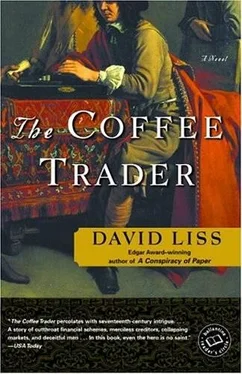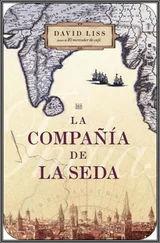
David Liss
The Coffee Trader
It rippled thickly in the bowl, dark and hot and uninviting. Miguel Lienzo picked it up and pulled it so close he almost dipped his nose into the tarry liquid. Holding the vessel still for an instant, he breathed in, pulling the scent deep into his lungs. The sharp odor of earth and rank leaves surprised him; it was like something an apothecary might keep in a chipped porcelain jar.
“What is this?” Miguel asked, working through his irritation by pushing at the cuticle of one thumb with the nail of the other. She knew he had no time to waste, so why had she brought him here for this nonsense? One bitter remark after another bubbled up inside him, but Miguel let loose with none of them. It wasn’t that he was afraid of her, but he often found himself going to great lengths to avoid her displeasure.
He looked over and saw that Geertruid met his silent cuticle mutilation with a grin. He knew that irresistible smile and what it meant: she was mightily pleased with herself, and when she looked that way it was hard for Miguel not to be mightily pleased with her too.
“It’s something extraordinary,” she told him, gesturing toward his bowl. “Drink it.”
“Drink it?” Miguel squinted into the blackness. “It looks like the devil’s piss, which would certainly be extraordinary, but I’ve no desire to know what it tastes like.”
Geertruid leaned toward him, almost brushing up against his arm. “Take a sip and then I’ll tell you everything. This devil’s piss is going to make both our fortunes.”
It had begun not an hour earlier, when Miguel felt someone take hold of his arm.
In the instant before he turned his head, he ticked off the unpleasant possibilities: rival or creditor, an abandoned lover or her angry relative, the Danish fellow to whom he’d sold those Baltic grain futures with too enthusiastic a recommendation. Not so long ago the approach of a stranger had held promise. Merchants and schemers and women had all sought Miguel’s company, asking his advice, craving his companionship, bargaining for his guilders. Now he wished only to learn in what new shape disaster would unfold itself.
He never thought to stop walking. He was part of the procession that formed each day when the bells of the Nieuwe Kerk struck two, signaling the end of trading on the Exchange. Hundreds of brokers poured out onto the Dam, the great plaza at Amsterdam ’s center. They spread out along the alleys and roads and canal sides. Along the Warmoesstraat, the fastest route to the most popular taverns, shopkeepers stepped outside, donning wide-brimmed leather hats to guard against damp that rolled in from the Zuiderzee. They set out sacks of spices, rolls of linen, barrels of tobacco. Tailors and shoemakers and milliners waved men inside; sellers of books and pens and exotic trinkets cried out their wares.
The Warmoesstraat became a current of black hats and black suits, speckled only with the white of collars, sleeves, and stockings or the flash of silver shoe buckles. Traders pushed past goods from the Orient or the New World, from places of which no one had heard a hundred years before. Excited like schoolboys set free of the classroom, the traders talked of their business in a dozen different languages. They laughed and shouted and pointed; they grabbed at anything young and female that crossed their path. They took out their purses and devoured the shopkeepers’ goods, leaving only coins in their wake.
Miguel Lienzo neither laughed nor admired the commodities set out before him nor clutched at the soft parts of willing shop girls. He walked silently, head down against the light rain. Today was, on the Christian calendar, the thirteenth day of May, 1659. Accounts on the Exchange closed each month on the twentieth; let a man make what maneuvers he liked, none of it mattered until the twentieth, when the credits and debits of the month were tallied and money at last changed hands. Today things had gone badly with a matter of brandy futures, and Miguel now had less than a week to pluck his fat from the fire or he would find himself another thousand guilders in debt.
Another thousand. He already owed three thousand. Once he had made double that in a year, but six months ago the sugar market collapsed, taking Miguel’s fortune with it. And then-well, one mistake after another. He wanted to be like the Dutch, who regarded bankruptcy as no shame. He tried to tell himself it did not matter, it was only a little while longer until he undid the damage, but believing that tale required an increasing effort. How long, he wondered, until his wide and boyish face turned pinched? How long until his eyes lost the eager sparkle of a merchant and took on the desperate, hollow gaze of a gambler? He vowed it would not happen to him. He would not become one of those lost souls, the ghosts who haunted the Exchange, living from one reckoning day to the next, toiling to secure just enough profit to keep their accounts afloat for one more month when surely all would be made easy.
Now, with unknown fingers wrapped around his arm, Miguel turned and saw a neatly dressed Dutchman of the middling ranks, hardly more than twenty years of age. He was a muscular wide-shouldered fellow with blond hair and a face almost more pretty than handsome, though his drooping mustache added a masculine flair.
Hendrick. No family name that anyone had ever heard. Geertruid Damhuis’s fellow.
“Greetings, Jew Man,” he said, still holding on to Miguel’s arm. “I hope all goes well for you this afternoon.”
“Things always go well with me,” he answered, as he twisted his neck to see if any prattling troublemaker might lurk behind him. The Ma’amad, the ruling council among the Portuguese Jews, forbade congress between Jews and “inappropriate” gentiles, and while this designation could prove treacherously ambiguous, no one could mistake Hendrick, in his yellow jerkin and red breeches, for anything appropriate.
“Madam Damhuis sent me to fetch you,” he said.
Geertruid had played at this before. She knew Miguel could not risk being seen on so public a street as the Warmoesstraat with a Dutchwoman, particularly a Dutchwoman with whom he did business, so she sent her man instead. There was no less risk to Miguel’s reputation, but this way she could force his hand without even showing her face.
“Tell her I haven’t the time for so lovely a diversion,” he said. “Not just now.”
“Of course you do.” Hendrick grinned widely. “What man can say no to Madam Damhuis?”
Not Miguel. At least not easily. He had difficulty saying no to Geertruid or to anyone else-including himself-who proposed something amusing. Miguel had no stomach for doom; disaster felt to him like an awkward and loose suit. He had to force himself each day to play the cautious role of a man in the throes of ruin. That, he knew, was his true curse, the curse of all former Conversos: in Portugal he had grown too used to falseness, pretending to worship as a Catholic, pretending to despise Jews and respect the Inquisition. He had thought nothing of being one thing while making the world believe he was another. Deception, even self-deception, came far too easily.
“Thank your mistress but give her my regrets.” With reckoning day soon upon him, and new debts to burden him, he would have to curb his diversions, at least for a while. And there had been another note this morning, a strange anonymous scrawl on a torn piece of paper. I want my money. It was one of a half dozen or so Miguel had received in the last month. I want my money. Wait your turn, Miguel would think glumly, as he opened each of these letters, but he was unnerved by the terse tone and uneven hand. Only a madman would send such a message without a name-for how could Miguel respond even if he had the money and even if he were inclined to use what little he had for something so foolish as paying debts?
Читать дальше













